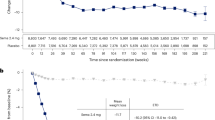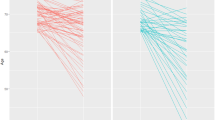Abstract
OBJECTIVE: To investigate parameters of energy metabolism during a 28 d VLCD to identify possible prognostic markers of weight change observed, subsequently, when the subjects were on a six-month hypocaloric diet. DESIGN: Longitudinal, clinical intervention study of a 2 MJ diet daily for 28 d and six month follow-up under a conventional, hypocaloric diet. SUBJECTS: Seven pre-menopausal women and one male all morbidly obese but otherwise healthy (age: 16–47 y, BMI 38.9–50.5 kg/m2). MEASUREMENTS: Body weight, resting energy expenditure (REE), resting respiratory quotient (RQ) and the 5 h thermic effect of food (TEF) were assessed by indirect calorimetry at the beginning and at the end of a 28 d VLCD treatment. Body composition was measured on day 1 by hydrodensitometry and tetrapolar bioelectrical impedance (TBIA), on day 28 by TBIA and nitrogen balance (NB) and by TBIA on follow-up. RESULTS: The individual weight loss during VLCD (mean 9.9±2.4 kg) was significant (P<0.01) and correlated significantly with energy deficit (r=0.83, P=0.01). REE/FFM decreased 6.2% (FFMTBIA) and 8.9% (FFMNB), respectively. TEF28 was unchanged from TEF1 while fasting RQ declined during the intervention period but was back to baseline already within one month of follow-up even though the mean weight loss at six months had increased to 14.0±5.6 kg. There was a significant (P<0.05) positive correlation between RQ28 and body-weight changes after one, three and six months of follow-up. The RQ28 explained 60–72% of the inter-individual variation in weight change. CONCLUSION: The resting RQ measurement is recommended as a simple and inexpensive assessment at the end of a strict weight-loss regimen in order to identify those individuals who may need greater assistance in maintaining a weight-loss when placed on a subsequent, free-living hypocaloric diet.
This is a preview of subscription content, access via your institution
Access options
Subscribe to this journal
Receive 12 print issues and online access
$259.00 per year
only $21.58 per issue
Buy this article
- Purchase on Springer Link
- Instant access to full article PDF
Prices may be subject to local taxes which are calculated during checkout
Similar content being viewed by others
Author information
Authors and Affiliations
Rights and permissions
About this article
Cite this article
Valtueña, S., Solà, R. & Salas-Salvadó, J. A study of the prognostic respiratory markers of sustained weight loss in obese subjects after 28 days on VLCD. Int J Obes 21, 267–273 (1997). https://doi.org/10.1038/sj.ijo.0800398
Received:
Revised:
Accepted:
Issue Date:
DOI: https://doi.org/10.1038/sj.ijo.0800398



